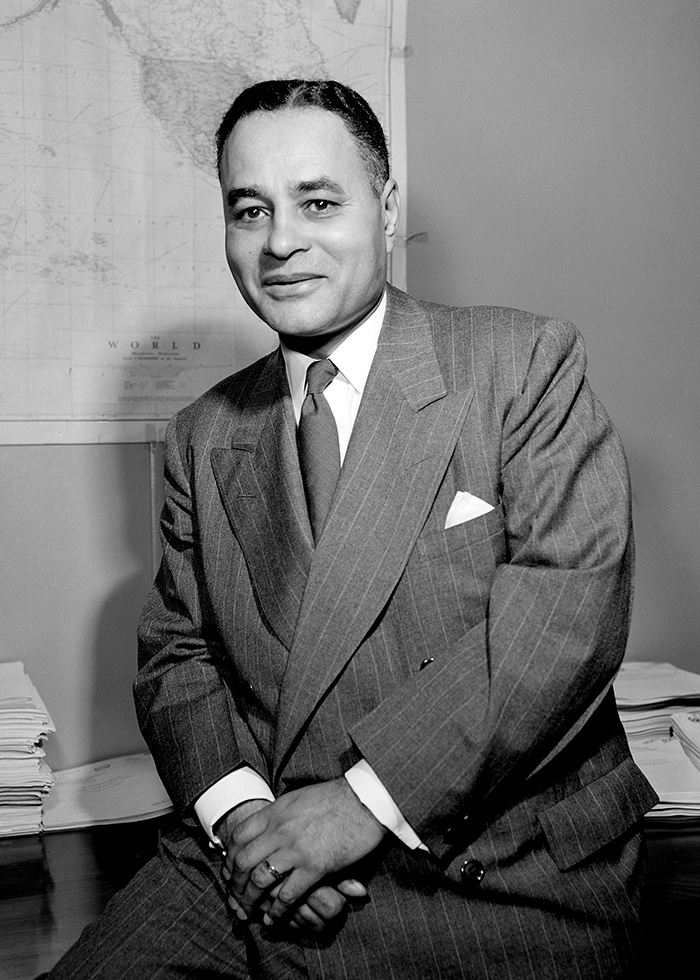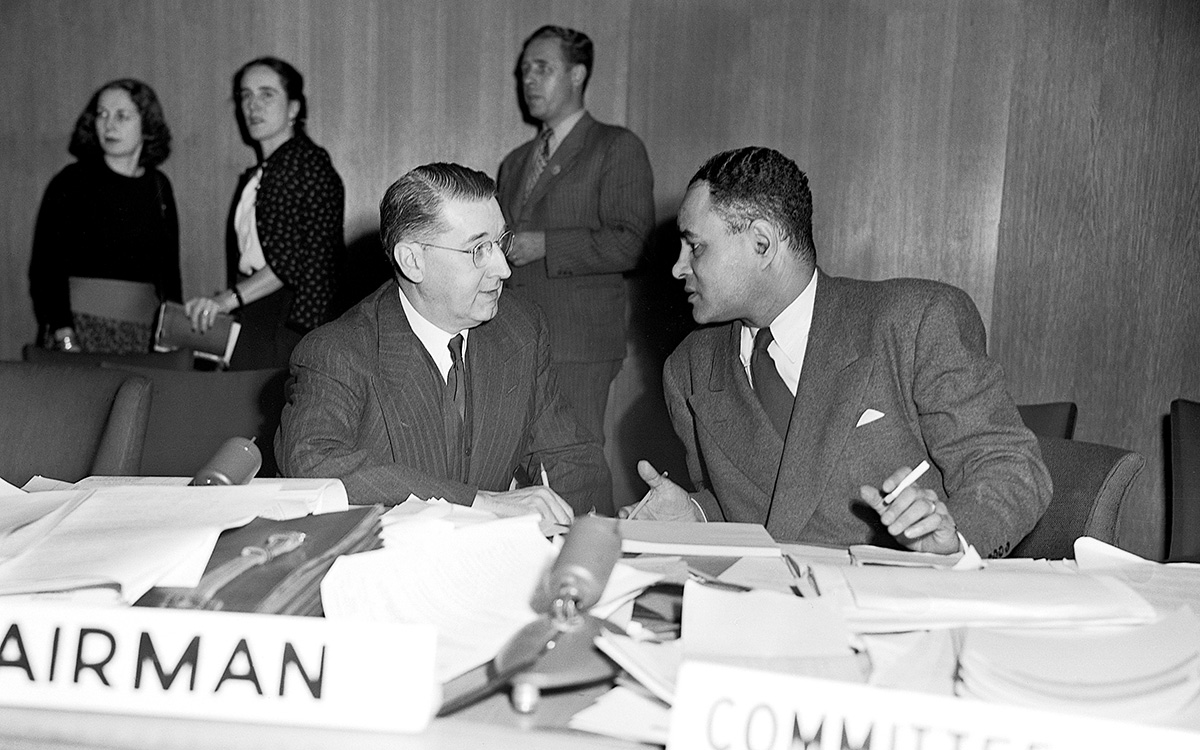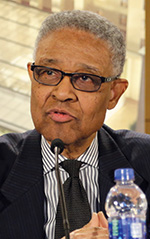Ralph J. Bunche, U.N. Architect
The first Black Nobel laureate made unique contributions to the establishment of the United Nations long before the peacekeeping achievements for which he is better known.
BY JAMES DANDRIDGE

Ralph J. Bunche in 1950 when he received the Nobel Peace Prize in recognition of his work as acting United Nations mediator in Palestine.
United Nations
“Ralph Bunche was too busy making history to record it,” Foreign Service Officer Lawrence “Larry” Finkelstein, who worked closely with Bunche at the State Department and the United Nations, once stated. Bunche successfully completed negotiations of the first peace treaty between Israel and its four Arab neighbors, the Rhodes Treaty Negotiations, in 1949. He was awarded the Nobel Peace Prize for this momentous achievement in 1950, the first Black laureate, and had a long and distinguished career as a United Nations diplomat.
Less known are Bunche’s enormous contributions prior to attaining world renown, contributions that were critical to the founding of the United Nations. Fortunately, Bunche’s attention to detail and his excellent drafting skills, as recovered and published by his close associates, make it possible to capture these contributions.
One of the major challenges of the post–World War I and post–World War II eras was colonialism—namely, the status of territories fought over in both wars. Bunche grappled with this issue from his early academic pursuits through his work at, successively, the Office of Strategic Services (1941-1944) as head of the Africa Section of the Research and Analysis Branch, the Department of State (1944-1946) as an adviser on colonial matters and the United Nations (1946-1954) as director of the Trusteeship Division.
While transitioning from the OSS through State to the United Nations, Bunche was also a tenured political science professor at Howard University (a position he relinquished in 1950). I was a freshman at Howard University in 1949. With our class, Bunche presided over the establishment of the first chapter of Phi Beta Kappa at Howard University, and we proudly strutted across the campus sharing the success of our professor’s accomplishments.
As a Bunche “junkie,” I have also been fortunate to have known many of those who worked closely with Bunche at various stages: Benjamin Rivlin, Bunche’s Office of Strategic Services assistant; Lawrence Finkelstein, Bunche’s assistant at State, who accompanied him to the 1945 San Francisco Conference to draft the U.N. Charter and served as his assistant when Bunche assumed directorship of the U.N. Trusteeship Division in 1946; and Sir Brian Urquhart, Bunche’s U.N. colleague, friend and successor U.N. Under-Secretary-General.
With their help, a review of this earlier 1941-1946 period in his career illuminates the unique contributions Ralph Bunche made to the United Nations long before the peacekeeping achievements for which he is better known. These contributions center on Bunche’s deep familiarity with the colonial aspects of the post–World War I peace agreements and his development of the basic principle of self-determination as the standard by which to judge a system of government.
Academic Underpinnings and Historical Context
One has only to reflect on Bunche’s early academic prowess at every level to see how later principles of humanism, freedom and conflict resolution took strong hold in his thinking. Born in 1904 in Detroit, he was raised by his maternal grandmother, Lucy Taylor Johnson, who moved the family to Los Angeles in 1919. He graduated with honors from 30th Street Intermediate School, where his grandmother insisted that he be given academic courses to prepare him for college. He then graduated first in his class and valedictorian from Jefferson High School, but he was not accorded a listing in recognized honor societies because of his race.
Bunche entered the southern branch of the University of California (later to become UCLA) and graduated summa cum laude as class valedictorian in 1927. In his commencement address, Bunche referenced the Great War (as World War I was then known), that “supreme catastrophe” that “seared deeply into the heart of humanity the burning realization that the world is in distress.” And he implored fellow students to become “socially valuable individuals” by developing their personalities—reason, self-consciousness and self-activity—to the fullest and adding a fourth dimension: “bigness,” which he defined as the soulfulness, spirituality, imagination, altruism and vision enabling one to understand and love one’s fellow man.
Ralph Bunche’s views were shaped by international events as he was growing up. World War I began in 1914 when he was 10 years old. The Great War pitted Germany, Austria-Hungary and the Ottoman Empire against Britain, France, Russia and, ultimately, the United States, Italy and Japan. The war lasted for four years, 1914 to 1918, and the peace settlement took another five years—from the 1918 Treaty of Versailles through to the 1923 Treaty at Lausanne, where peace was finally reestablished. During the subsequent 1924-1930 period, the League of Nations, established in 1919 under Part I of the Treaty of Versailles and based in part on President Woodrow Wilson’s “Fourteen Points,” became operational, and programs and practices emerged to govern international conduct.
One has only to reflect on Bunche’s early academic prowess at every level to see how later principles of humanism, freedom and conflict resolution took strong hold in his thinking.
Besides calling for establishment of an international organization to enforce the peace, Wilson’s “Fourteen Points” dealt with the disposition of colonial claims, a large and critical aspect of the war. Point V, which went some way toward establishing the principle of self-determination, called for: “A free, open-minded, and absolutely impartial adjustment of all colonial claims, based upon a strict observance of the principle that in determining all such questions of sovereignty the interests of the populations concerned must have equal weight with the equitable claims of the government whose title is to be determined.” (This was a most interesting position taken by a president who resegregated the federal capital city, but that is another matter.)
In the charter of the League of Nations, Wilson’s Point V was translated into a system in which direct colonial control was supplanted by “mandates” to “tutor” former colonial territories inhabited by “peoples not yet able to stand by themselves.” Thus, Article 22 of the League’s charter states: “To those colonies and territories which as a consequence of the late war have ceased to be under the sovereignty of the States which formerly governed them and which are inhabited by peoples not yet able to stand by themselves under the strenuous conditions of the modern world, there should be applied the principle that the well-being and development of such peoples form a sacred trust of civilization and that securities for the performance of this trust should be embodied in this Covenant.
“The best method of giving practical effect to this principle is that the tutelage of such peoples should be entrusted to advanced nations who by reason of their resources, their experience or their geographical position can best undertake this responsibility, and who are willing to accept it, and that this tutelage should be exercised by them as Mandatories on behalf of the League.”
Against this background, Ralph Bunche, now 20 years old, undertook the study of political and social science, international relations and Africa. After graduating from UCLA in 1927, he was off to Harvard, where he received an M.A. in political science in 1928. He then wrote to William E.B. Dubois at Howard University, requesting help in finding an opportunity to perform social service for “his people” before continuing doctoral studies at Harvard. He was appointed an instructor and assistant professor at Howard in 1928 and established Howard University’s Political Science Department that year, serving as its chairman until 1944.
Bunche was awarded the Osias Goodwin Fellowship at Harvard to pursue his doctorate in government and international relations, which he completed in 1934. The first Black man to earn a political science doctorate from an American university, he was awarded the Toppan Prize for outstanding research in social studies.
Studying Colonialism in Africa
Bunche’s Ph.D. dissertation, “French Administration in Togoland and Dahomey,” was a comparative analysis of how colonized people fared under direct French colonialism (Dahomey) and under the League of Nations’ mandate system (Togoland, a German colony from 1884, was split in half under the Treaty of Versailles, with half becoming a French mandate and half a British mandate). Bunche developed a comparative research design to test whether the military, educational and native policies were better in one system than the other, and he traveled to Europe and Africa to conduct research and gather data on French administration in the two settings.
Bunche pored over data in colonial archives in Paris and London but also collected data on the ground in Africa. He argued that the most valid data were the native populations’ own perceptions of their welfare under the two systems. As he wrote in his thesis, he found no significant difference between the two systems: “To the Togolese, the French in Togo are merely some more colonial administrators with a new and strange language and a knack for collecting taxes. In truth, this new status means little to them now and will continue so for many years.”
To understand the principle of self-determination is to understand Ralph Bunche’s later work as chief of the United Nations Trusteeship Division.
Bunche’s views, vividly reflected in his thesis, were remarkably like the anticolonial sentiments of the times. In A World View of Race, a monograph written in 1936 to amplify the conclusions of his doctoral research, Bunche observes: “Approximately one-third of the human race is directly subject to imperialist domination. … The so-called backward peoples would hold no attraction for the advanced peoples if they possessed no human or material resources which are needed by the industrial nations.” As the colonial regimes he investigated closely demonstrate, he argues, the many completely unscientific theories of racial superiority and inferiority are employed to maintain a social and economic structure in which privilege and wealth is enjoyed by the few.
As Larry Finkelstein has noted, Bunche argues that race did not explain imperialism, but had rather been “a convenient device for the imperialist.” Bunche believed that greed was the predominant motive of imperialism, and that colonialism and imperialism were pure manifestations of racism. He was acutely aware of this deep down: It was borne out personally to him as a Negro (a label that he proudly bore) and a direct target of racism, among other instances, when Secretary of State Cordell Hull had to intervene to unblock permission for Bunche to visit South Africa on scholarly business—permission that had, until then, been denied him.
Bunche’s conclusion that the real goals of colonialism were economic in motivation and had nothing to do with “people not yet able to stand by themselves” (as per League of Nations Article 22) strengthened his belief that self-determination was the only legitimate standard for government of the colonial African countries. In his view, colonialism could never meet that standard unless the people of a colony, themselves, chose a colonial regime as an act of “self-determination.”
As Bunche said in a 1942 talk at the Institute of Pacific Relations conference in Mont-Tremblant, Quebec: “Schemes of international organizations … these are all means and not ends. … The real objective must always be the good life for all of the people … peace, bread, a house, adequate clothing, education, good health, and above all, the right to walk with dignity on the world’s great boulevards.”
To understand the principle of self-determination is to understand Ralph Bunche’s later work as chief of the United Nations Trusteeship Division. There, he would oversee the establishment of the U.N. Trusteeship Council and guide the work of the Fourth Committee, which was responsible for decolonization matters.

Ralph J. Bunche of the U.N. Secretariat (at right) and Benjamin Gerig of the United States (at left) discuss a point at a meeting of a subcommittee of the United Nations’ Fourth Committee (the Special Political and Decolonization Committee of the U.N. General Assembly), on Dec. 4, 1946, in Lake Success, New York. Both were members of the Fourth Committee.
United Nations
At the State Department
There was one more important step in Ralph Bunche’s journey to the United Nations. In 1945, he joined the State Department as associate chief of the Division of Dependent Area Affairs, appointed in a professional position to advise and participate with the U.S. delegation in the design of the trusteeship mandates within the U.N. Charter. This was precisely where Bunche’s preparation and expertise lay, as Larry Finkelstein has said so eloquently. But as a junior officer dealing with decisions about post–World War II territories and colonial mandates that had already been made, he had two arms and a leg tied from the start.
The British had been adamant about this issue, so there were firm “understandings” on their role. And there was intermittent warfare going on with the War Office (Department of the Army) and Department of Navy on what to do with the post–World War II South Pacific territories, on which there would be absolutely no movement for the sake of preserving forward military bases. So, in a few words, not only did he not have a blank check, he had no blank slate on which to write.
Though serving in a relatively junior position, he nonetheless had an unusual opportunity as a young diplomat to play a part in stirring events. During Bunche’s first months at State, his immediate supervisor, Benjamin Gerig, attended most of the policymaking meetings. But Bunche served as “assignment secretary” with the American delegation to the Dumbarton Oaks Conference in 1944, where a draft of the United Nations Charter was agreed on.
No decision was formally made to authorize the U.S. delegation to introduce the document Bunche had so diligently drafted en route to San Francisco.
This insider experience served Bunche well for later positions of responsibility undertaking more challenging roles in the absence of his overtasked supervisor, Gerig. Here Bunche’s competence began making its mark, starting with the negotiations between the State and Interior Departments, on the one hand, and the War and Navy Departments, on the other, over whether the United States would make a trusteeship proposal at the San Francisco Conference.
By the time that Bunche took his job at State, official U.S. policy was that trusteeships should be designed to deal with colonial territories that had been under League of Nations mandate, as well as those taken from Axis powers in the war. The American plan did allow for a small, albeit not very effective, proviso for extension of the trusteeship system to other territories placed under it voluntarily by the powers administering them. But many “non-self-governing” territories remained in the hands of colonial powers.
Bunche slowly became more involved in high-level decisions. He was listed among the State Department officials who participated in the ad hoc group dedicated to the International Committee on Dependent Area Aspects of International Organization to deal with Cabinet-level disagreement. And he was one of a small group sent to the April-June 1945 San Francisco UNCIO Conference to negotiate and coordinate a proposal. According to Larry Finkelstein, Bunche basically wrote the draft single-handedly on the train to San Francisco. In the end, it was not Ralph Bunche but rather his boss Benjamin Gerig who was credited with creating the arrangements for non-self-governing territories.
An Architect of the United Nations
Of course, the story does not end here, in that no decision was formally made to authorize the U.S. delegation to introduce the document Bunche had so diligently drafted en route to San Francisco. The British provided an opening, and the Australians took the initiative to save the day. The U.N. Charter’s Chapter XI is titled “Declaration Regarding Non-Self-Governing Territories.” This chapter, which deals with colonial territories not included in the trusteeship system, is based on a weak draft on trusteeship made by the British delegation, designed to counter the stronger American draft. The draft used language from Article 22 of the League of Nations Covenant.
The Australians had been working on colonial issues during the war, and their views were closer to those of the Bunche draft. Bunche took advantage of the opportunity and informally passed a copy of the draft U.S. declaration to his Australian counterpart. The Australians drew on it and introduced an amendment to the British proposal, which became Article 73 of the charter, directing colonial administrations to, among other things, “develop self-government” and “take due account of the political aspirations of the peoples.” As Larry Finkelstein has said, “If Bunche cannot claim paternity, he at least attended at the accouchment.”
The precedents set by Bunche in the design and functioning of the United Nations trusteeship system ... decisively advanced the process of decolonization around the world.
A second opportunity for U.S. contribution to a strong United Nations presented itself on Labor Day weekend in 1945 when the new Secretary of State, James Byrnes, was at sea en route to the first Council of Foreign Ministers meeting in London. He needed information on how to deal with the Italian territories after the end of the war. Bunche quickly rounded up Larry Finkelstein and Thomas F. Power. Under Bunche’s direction, a plan was drawn up, but the Council of Foreign Ministers had already precooked a policy position. Some years later, the Philippine delegation successfully introduced a plan that was amazingly like the earlier American delegation’s proposal.
There is little doubt that the precedents set by Bunche in the design and functioning of the United Nations trusteeship system, with objectives that included eventual independence, decisively advanced the process of decolonization around the world.
As a government officer dealing with colonialism and mandate matters during World War II, Ralph Bunche established a reputation that paved the way for his recruitment into the United Nations after the war. The service that would win him world renown, as mediator in Palestine and as United Nations peacemaker extraordinaire, resulted from his appointment to the U.N. Secretariat in the spring of 1946 as head of the Trusteeship Division. The State Department circle was completed with the assignment of Larry Finkelstein to that same U.N. division with Bunche, and the assignment some years later of another young State Department diplomat, Ambassador Terence A. Todman.
Ralph J. Bunche skillfully moved from the challenge of the epoch, trusteeship, to the threat of the period, conflict resolution—making the transition from the post–World War I territorial issues to the post–World War II peacekeeping contributions. He is rightfully accorded the signature recognition of an accomplished United Nations architect.
Read More...
- “Ralph Bunche Biographical,” Nobelprize.org
- “Ralph J. Bunche – U.N. Mediator in the Middle East and Nobel Laureate,” Renee Earle, American Diplomacy, February 2020
- “Dr. Ralph Bunche, Nobel Peace Prize Laureate and Peace Negotiator,” Jennifer Davis, Library of Congress, December 8, 2017



